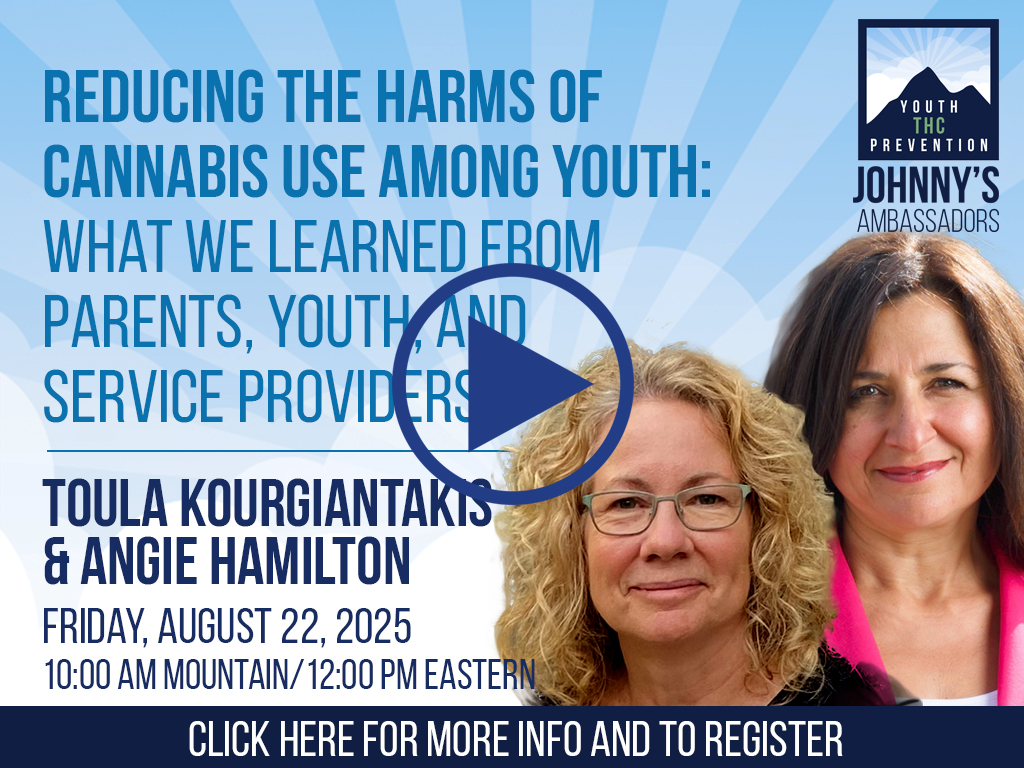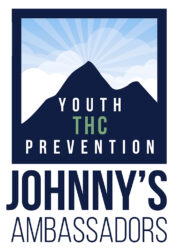Reducing the Harms of Cannabis Use Among Youth: What We Learned from Parents, Youth, and Service Providers
Co-Presenters: Toula Kourgiantakis & Angie Hamilton
Cost: $0
Please join our Johnny’s Ambassadors in ACTION Facebook Group!
Watch this video on Rumble and please SUBSCRIBE to our show!

Description
In 2018, Canada legalized recreational cannabis, primarily to protect young people by limiting their access and raising public awareness of health risks. However, cannabis use in Canada remains among the highest in the world, and public education on the risks has been limited. Cannabis use among youth is a significant public health concern, and more information is needed about the associated harms and risks. This presentation describes a study conducted in Ontario that explored how youth, parents, and service providers perceive the risks and harms related to cannabis use, as well as their perspectives on harm reduction, including the obstacles to reducing these risks and harms. The study was conducted in partnership with Families for Addiction Recovery (FAR), a community charity founded by parents of youth with addiction-related concerns. Eligible participants included (1) parents or caregivers of youth who use cannabis regularly, (2) youth who use cannabis regularly, and (3) mental health or addiction service providers working with youth. We conducted virtual interviews with 88 participants: 31 youth, 26 parents, and 31 service providers. Participants described various harms associated with cannabis use, including effects on brain development, motivation, concentration, finances, employment, education, and overall physical and mental health. They also highlighted the stress this creates for families. Participants noted the minimization of risks, conflicting public messages, normalization of use, and the belief that cannabis is less harmful than other substances. They also identified several key challenges to applying harm reduction approaches, including easy access to cannabis, inadequate public education, limited or inaccessible services, insufficient service provider training, and the exclusion of families from services and treatment. The presentation will conclude with recommendations for a public health approach to better support youth and families.
Learning Objectives
- Understand the risks and harms associated with youth cannabis use, as described by youth, parents, and service providers.
- Highlight the challenges youth, parents, and service providers identify in addressing cannabis use and reducing related harms and risks.
- Learn recommendations for a public health approach to better support youth and families.
Speaker Bios
Dr. Toula Kourgiantakis is a social worker and family therapist, and a Clinical Fellow of the American Association of Marriage and Family Therapy. She has over 30 years of experience working with families, couples, children, and youth across various sectors, including child protection, schools, mental health and addiction treatment, community agencies, hospitals, and private practice. Dr. Kourgiantakis is an Associate Professor in the School of Social Work at Université Laval and the Director of the PhD program. Her research focuses on youth mental health and addictions, family involvement in treatment and services, and the training and education of mental health professionals. She is currently leading research projects on youth suicide prevention and on cannabis use among youth and young adults following legalization in Canada.
Angie Hamilton is a retired lawyer, the Executive Director and Co-Founder of Families for Addiction Recovery (FAR) and the parent of a child who struggles with addiction. Angie is a member of the Policy Committee of the Canadian Society of Addiction Medicine and a Board Member of The Ontario Family Caregivers’ Advisory Network. Angie is or has been a member of various advisory panels for Toronto Public Health, The Office of the Chief Medical Officer of Health of Ontario and The Canadian Centre for Substance Use and Addiction. She was a member of the National Board of MADD Canada and the Chair of their Public Policy Committee.
Questions?
Email Founder & CEO, Laura Stack, at [email protected].

